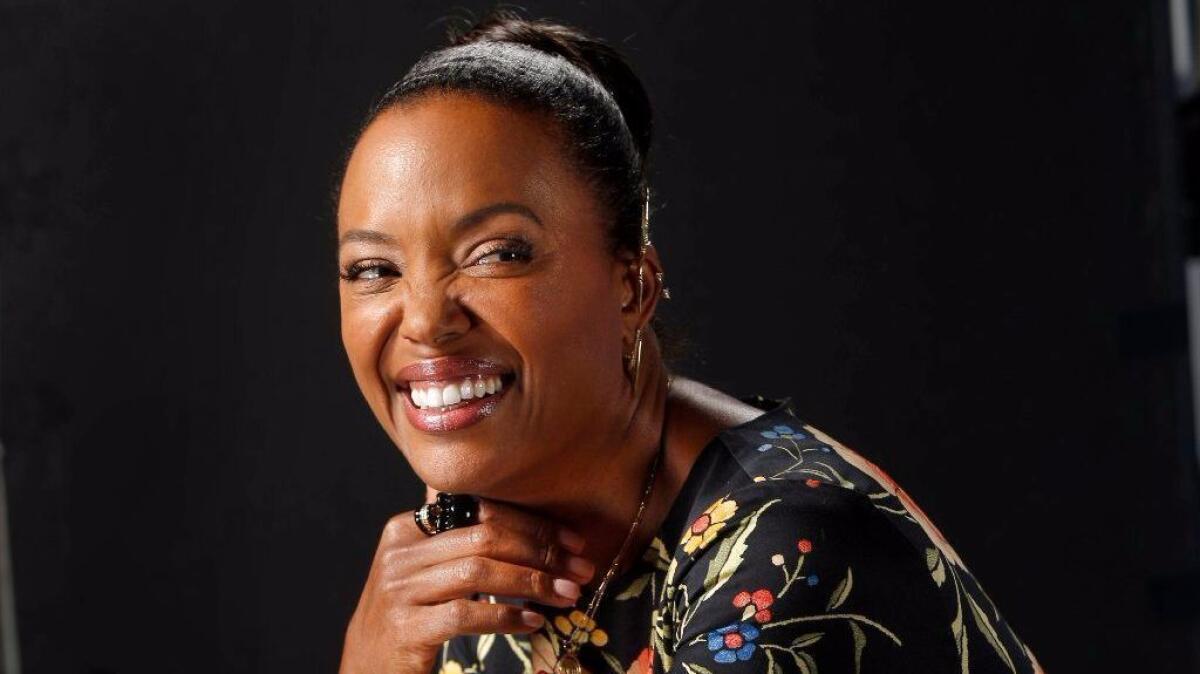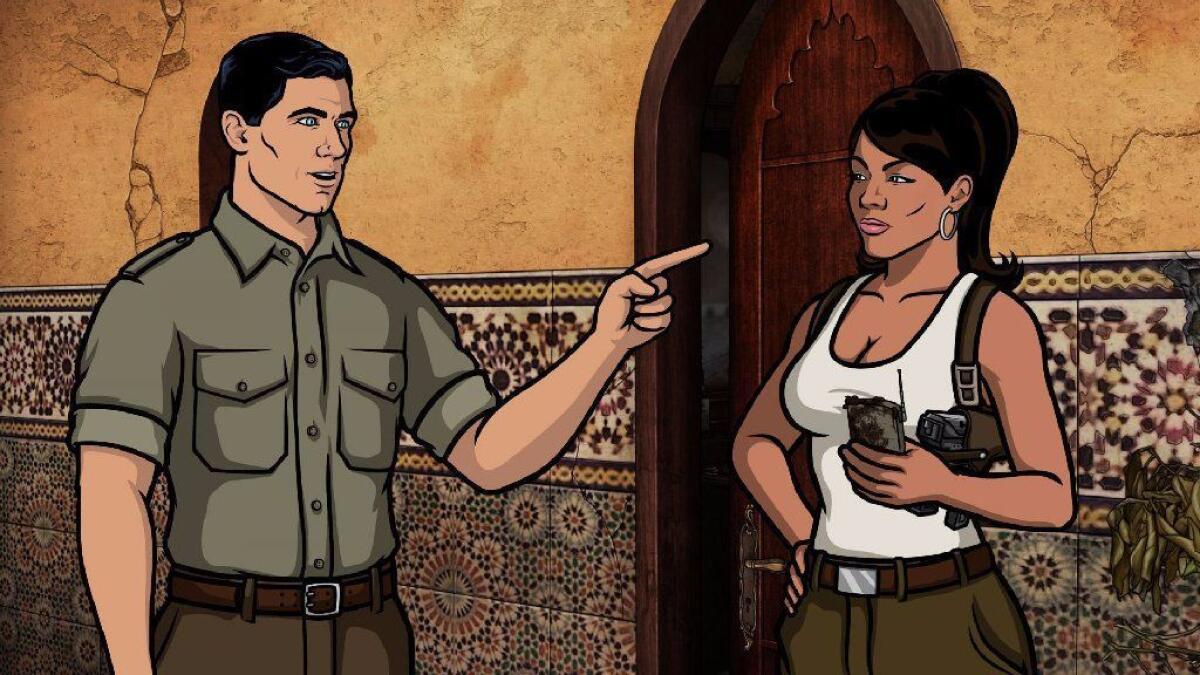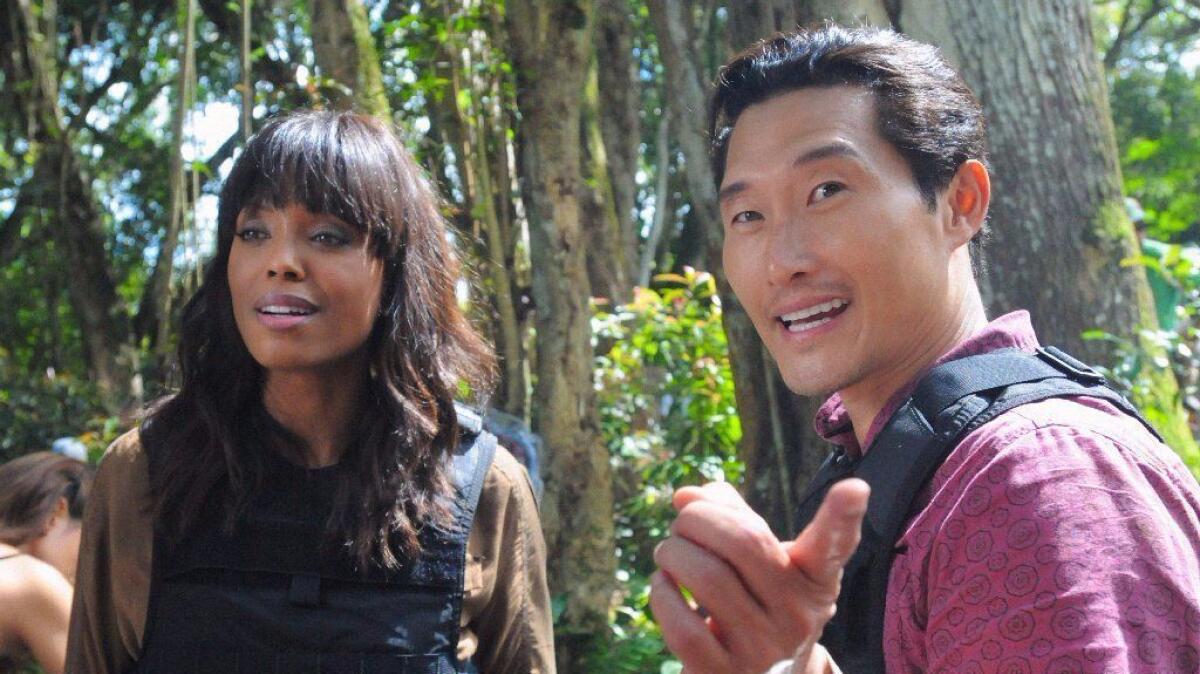Aisha Tyler isnât a âblack comic.â Sheâs a comic who is black.

When thinking of the most memorable black comics â even if weâre solely focusing on black women â Aisha Tylerâs name probably doesnât come to mind. Perhaps thatâs because the co-host of âThe Talkâ and voice of one of âArcherâsâ most beloved characters has never been a âblack comicâ in the way the industry and audiences initially expected her to be. In comparison to some of her contemporaries like MoâNique or Sommore, Tyler was less bold and more âweird.â
âMy comedy wasnât what somebody would describe as âblack comedy,ââ she said. âI wouldâve never been able to get on âDef Comedy Jam,â because my style was too odd and more informal. It wasnât the big, presentational, rock-stadium style.â
That uniqueness, however, is what served Tyler â who currently hosts improv comedy show âWhose Line Is It Anyway?â and is a series regular on both âCriminal Mindsâ and âArcherâ â best in the long run.
How did you get into comedy?
I went to a performing arts school called the McAteer School of the Arts. My gateway was actually improvisational comedy, along with Margaret Cho and Jim Rockwell. Then I went to college and was going to be a lawyer. I literally went to see a stand-up show when I was there and was radicalized. It was like I discovered fire or something. [laughs] Then I got out of college and was working and having an existential crisis and I realized it was because I wasn't performing. I decided to try stand-up because it was something you could do without knowing anybody. I tried it one time and I fell in love with it.
Who are you comedic inspirations?
I think Iâm part of the last generation where there were so few women doing comedy... so a lot of my inspirations are men: Richard Pryor, Lenny Bruce, Marc Maron. I used to watch [Maron] all the time and he was a guy up there who just looked like he was having conversations. When I started, Iâd be on a lineup with just me and nine guys.
Your style of comedy is different than many of the black comediennes you came up with.
That was frustrating, because I would do shows and people would expect me to come out and do the âQueens of Comedyâ-style thing. It took me awhile to find my tribe, but it was important for me to be honest to myself instead of trying to compete with Sommore or MoâNique, people who were doing the bigger style of comedy.
It's important to show little girls that you donât have to conform to some sort of standard of who you're supposed to be because of your ethnicity or gender.
â Aisha Tyler

How did not being a âblack comicâ affect your transition to Hollywood?
I had to wait for my audience to find me. People are always trying to force you to conform â until youâre successful and then youâre iconoclastic and a rebel and a maverick and a renegade. I just stuck to my guns and then at some point what I did was special. At first, I was weird and didnât fit in and then [the industry said], âWe got it. Youâre different and original.â
You just have to know yourself as an artist. Stick to your guns creatively. That saved me when I came to L.A. and has allowed me to carve a space for myself that's relatively unique. And that came out of the mental toughness I developed early on in my stand-up career with people telling me to change.
How would you describe your audience?
One thing Iâm really proud of is that I have such a diverse fan base. My audience is a bachelorette party and a bachelor party and a bunch of Asian guys and gay men and older black women. My specificity has translated into a universality with my audience.
What is auditioning like for you?
In terms of the roles Iâve been offered, I'm in a unique position in that there arenât a lot of people who have been able to work across media like I have â Iâm on a daytime talk show and on a drama and a comedy. Thatâs really unusual, but I pursued that diversity and chased those roles.
Very few people have the power of âYesâ in this industry â you canât call up [
As a performer, it's important for me to show little girls like I was that you donât have to conform to some sort of standard of who you're supposed to be because of your ethnicity or gender.
Have things changed since you started?
Whatâs changed â and it's not because of me â is there are a lot of black women out there doing something different: Issa Rae, Sasheer Zamata, Jessica Williams. Theyâre really being themselves. Thatâs what's important [because it shows] weâre as diverse as any group.
Every success that women have had in this town is because they wrestled it from the jaws of the beast.
â Aisha Tyler

Black women donât seem as able to become comedic superstars in the way their white and male counterparts have. Why is that?
I think that's a subset of the issue of the opportunities for women in Hollywood at large, and it's more difficult for women of color specifically. I just directed my first feature, and like 7% of all features last year were directed by women. And then if you think of the subset of women of color, thereâs Ava DuVernay and just a few others. I think it's the same thing with comedy. There isnât the opportunity⌠but there never has been the opportunity [for us]. Every success that women have had in this town is because they wrestled it from the jaws of the beast. But that will change and it's changing now and will continue to change especially for women of color.
But unfortunately, unless you're a 24-year-old blond girl, youâre going to have to go out and do it yourself. That's just the way it is â and maybe I seem like Iâm heartless or divorced from the issue, but Iâm not. I wanted to make a movie and I couldâve sat around and complained about the fact that studios werenât going to give me money because Iâm a woman or black or many other reasons, but I just went out and made my movie because that's how things are going to change, not by waiting for someone to give you permission. This is not a town thinking altruistically. They are thinking about money.
What other pieces of advice do you have for black women coming behind you?
Be relentless, utterly, on-pointedly, doggedly relentless. People are going to tell you ânoâ for many reasons and your single mission should be to prove them wrong every day. There are so many talented women of color who arenât getting the opportunities that they deserve, and that is a sad and frustrating reality of this business. But the only response to that is your own hard work and brilliance and relentlessness.
Hollywoodâs going to change when it's forced to change. No one is going to open a door. Youâre going to have to kick it in. A guy in a suit is not the answer. More opportunities in Hollywood would be nice, but thatâs not the answer either.
Youâre the answer. Make yourself undeniably funny and talented and alluring. It may take you a little longer because you're a woman of color, but if you donât stop, you will get there.
Get your life! Follow me on Twitter (@TrevellAnderson) or email me: [email protected].
The biggest entertainment stories
Get our big stories about Hollywood, film, television, music, arts, culture and more right in your inbox as soon as they publish.
You may occasionally receive promotional content from the Los Angeles Times.








